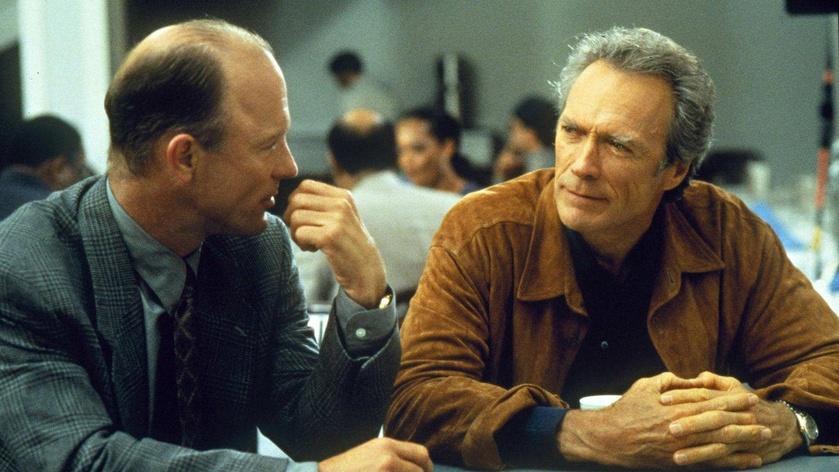In 1997 and 1999 Clint Eastwood directed and stared in two movies based on popular novels, Absolute Power and True Crime, respectively. Around this time he was already starting to look a little on the healthy side of aged, but rather than deny his years (too much) he simply accepted them. In Absolute Power he’s still fit enough to plausibly repel out a window, yet old enough say he can’t and people would believe him.
Sometime in my youth I confused this with another Eastwood movie and put it on to watch with my dad. The first scene with Gene Hackman was... awkward.
Hackman plays President Richmond, a slimeball who likes rough sex with other men’s wives. Eastwood, as Luthor Whitney, is the thief who witnesses one of these trysts gone wrong when the woman defends herself and the Secret Service shoots her. Both men might have gotten away with their respective crimes if not for homicide Det. Frank (Ed Harris), and Agent Burton (Scott Glenn), the Secret Service man with a conscience. As Frank goes on the hunt, he seeks out Luthor’s estranged daughter, Kate (Laura Linney).
One of Eastwood’s real-life estranged daughters has a cameo.
Obviously, this movie came out at a time when Americans were already looking sideways at the Oval Office and the real-life slimeball philanderer who occupied it. That part wasn’t a stretch for our imaginations. The rest of the plot is, admittedly, a little silly. Several major twists depend on Luthor’s use of disguises, and no one who moves and sounds like Eastwood could ever pull off a disguise.
It’s easier to believe he could hack a state-of-the-art home security system.
Three things kept me glued to my TV, despite all the contrivances of a novel you pick up at the airport.
First, the movie takes time to breathe. Eastwood builds his characters and world with loving care, using the camera to invite us in so that we can know them. Nothing on the screen is unnecessary, but it’s shot with loving artistry. Before this I watched Extraction 2 on Netflix, which has slow, character moments. But they feel obligatory, almost as if the director resented having to check those story boxes between spectacular action set pieces.
Movies today want us breathless.
Second, it’s the father-daughter relationship that gives the movie heart and character arcs. Kate resents that her dad spent most of her life in prison and wants nothing to do with him. In her life and career she’s been very successful, and while she never acknowledges it she wishes he’d been there to celebrate her achievements. What she later comes to realize is that after he was released he was there, watching from a distance with pride. The warmth Luthor feels for her begins to be reciprocated, even though they hardly speak. And if Luthor didn't feel that family is sacred, he wouldn't have risked everything to take down the most powerful man on earth.
Characters are the heart of every story, and watching them heal is cathartic.
Third, I appreciated how the dialog wasn’t too clever. In the scene where Frank shows up at Kate’s office to ask her questions about her dad, I found myself anticipating her answers. Call it an occupational hazard that I’m writing dialog for the movie I’m watching as I’m watching it. What I imagined was sharp, quippy, and conveyed the same meaning. William Goldman’s script doesn’t do that. Rather, it’s honest. Real. It doesn’t take us out of the moment to show how clever he is or showcase the actors’ abilities.
We’re so immersed in wit, I didn’t realize how infectious it is until it was removed.
Is Absolute Power a movie I’m in a hurry to watch again or study further? No, not really. But I still found a few things to admire, so I can recommend it if you’ve never seen it or it’s been awhile.

























